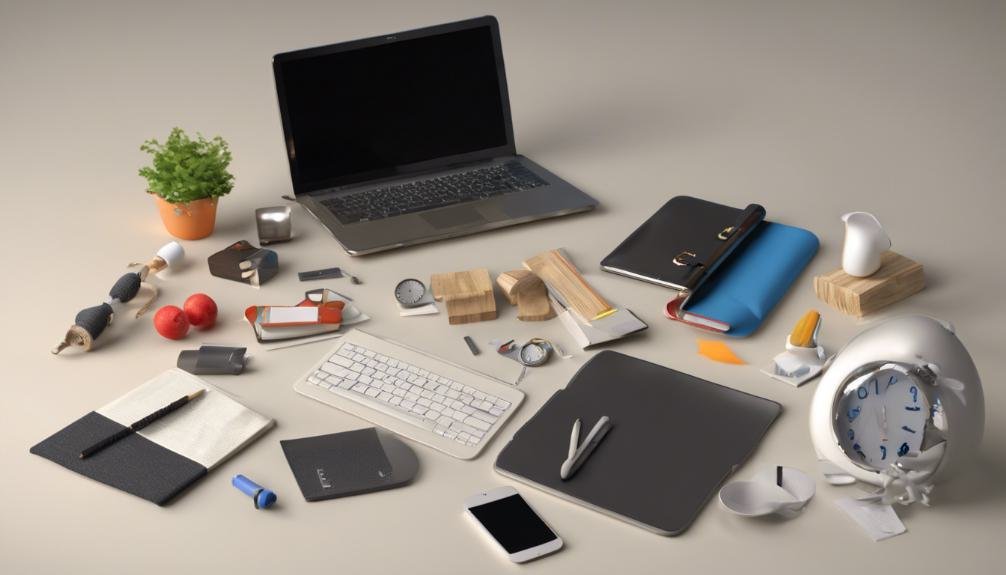The Importance of Work-Life Balance
Maintaining work-life balance is essential for your well-being in today's fast-paced world. It involves managing your time effectively to prevent burnout and reduce stress levels. Prioritizing self-care and setting boundaries between work and personal life enhance your mental and emotional health. A balanced lifestyle leads to improved productivity, creativity, and overall happiness. By ensuring a healthy equilibrium between your professional and personal life, you can experience reduced stress, increased efficiency, and a more fulfilling life. Remember, finding this balance is key to leading a successful and harmonious life.
Key Takeaways
- Enhances well-being and reduces stress.
- Improves productivity and creativity.
- Prevents burnout and boosts mental health.
- Establishes boundaries for a healthier lifestyle.
- Enhances overall quality of life.
Understanding Work-Life Balance
What exactly is work-life balance and why is it important in today's fast-paced world?
Work-life balance is the equilibrium between the time and effort you dedicate to your professional life and personal life. It involves effective time management to make sure that work responsibilities don't encroach on personal time, and vice versa. This balance is vital in today's fast-paced world to prevent burnout, reduce stress levels, and enhance overall well-being.
Time management plays a pivotal role in achieving work-life balance.
By efficiently allocating your time to work tasks and personal activities, you can prevent work from spilling over into your personal life, creating boundaries that are crucial for maintaining a healthy balance. Effective time management allows you to prioritize tasks, delegate when necessary, and set realistic goals to make certain both professional and personal responsibilities are met without causing undue stress.
Moreover, work-life balance serves as a significant stress relief mechanism.
When you maintain a healthy balance between work and personal life, you can reduce stress levels, prevent feelings of overwhelm, and improve your overall quality of life. Prioritizing self-care and personal time alongside work commitments is essential for promoting mental and emotional well-being.
Benefits of a Balanced Lifestyle
Maintaining a balanced lifestyle offers numerous advantages for both your physical and mental well-being.
When it comes to mental health, a balanced lifestyle can greatly reduce stress, anxiety, and burnout. By setting boundaries between work and personal life, you give yourself the opportunity to recharge and focus on activities that bring you joy and relaxation. This, in turn, can lead to improved overall mental well-being and a more positive outlook on life.
Furthermore, a balanced lifestyle can enhance your productivity and efficiency. When you prioritize self-care, exercise, adequate sleep, and time for hobbies or socializing, you're better equipped to perform well in your professional life. Taking breaks and setting aside time for activities outside of work can boost creativity, problem-solving skills, and overall performance.
Strategies for Prioritizing Well-Being
To maintain a healthy work-life balance, it's essential to prioritize your well-being through self-care practices and setting boundaries.
By taking the time to care for yourself physically, mentally, and emotionally, you can better handle the demands of work and personal life.
Setting clear boundaries helps you allocate time and energy effectively, ensuring that you have the necessary balance to thrive in all areas of your life.
Self-Care Practices
Prioritizing self-care practices is essential for maintaining a healthy work-life balance and overall well-being. Stress management and relaxation techniques play an important role in helping you unwind and recharge. Integrating mindfulness, deep breathing exercises, or meditation into your daily routine can greatly reduce stress levels.
Additionally, engaging in activities you enjoy, such as reading, walking, or listening to music, can provide a much-needed break from work-related pressures.
Effective time management and scheduling priorities are key components of self-care. By organizing your tasks and setting realistic goals, you can prevent feeling overwhelmed and make sure you have time for both work and personal activities. Allocating specific time slots for work, exercise, socializing, and relaxation can help you maintain a sense of balance in your life.
Setting Boundaries
To safeguard your well-being and maintain a healthy work-life balance, it's important to establish clear boundaries in both your professional and personal life. Setting personal boundaries is vital for effective time management and stress management.
In your professional life, clearly define your work hours and make sure that you communicate them to your colleagues. Let them know when you're available and when you need uninterrupted time to focus on tasks. Prioritize your workload based on deadlines and importance, learning to say no to tasks that can be delegated or aren't urgent.
In your personal life, establish healthy boundaries with friends and family regarding your availability. Allocate specific times for self-care activities, hobbies, and relaxation. Limit the time spent on work-related activities during your personal time to prevent burnout.
Setting Boundaries and Limits
When it comes to achieving a healthy work-life balance, setting clear boundaries and limits is crucial. Establishing boundaries at work can help you maintain focus, productivity, and prevent burnout.
Similarly, setting limits for your overall well-being guarantees you prioritize self-care and maintain a sustainable lifestyle.
Boundaries at Work
Establishing clear boundaries at work is essential for maintaining a healthy work-life balance. By setting boundaries and limits, you can effectively manage your time and reduce stress levels. Here are some tips to help you establish boundaries at work:
| Setting Boundaries | Description | Benefits |
|---|---|---|
| Manage Your Time | Prioritize tasks and set limits | Improved productivity |
| Communicate Effectively | Clearly express your limits | Reduced misunderstandings |
| Take Breaks | Step away to recharge | Enhanced focus and creativity |
| Learn to Say No | Don't overcommit yourself | Reduced workload and stress levels |
| Create Work-Life Balance | Set clear work hours | Improved overall well-being |
Implementing these boundaries will not only help you manage your time effectively but also reduce stress, leading to a more harmonious work-life balance. Remember, it's important to advocate for yourself and set boundaries that prioritize your well-being.
Limits for Well-Being
Establishing boundaries for your well-being is vital in maintaining a healthy work-life balance and guaranteeing your overall health and happiness. When setting limits for your well-being, it's essential to prioritize mental health and effective time management.
Here are some key considerations to help you establish boundaries effectively:
- Protect Your Mental Health: Recognize when work demands are impacting your mental well-being. It's okay to say no and set limits to safeguard your mental health.
- Manage Your Time Wisely: Set specific work hours and stick to them. Avoid overworking by scheduling breaks and personal time to recharge.
- Define Clear Boundaries: Communicate your boundaries to your colleagues and superiors to ensure they understand and respect your limits.
- Create a Work-Free Zone: Designate a space in your home that's free from work-related activities to help separate your personal life from work responsibilities effectively.
Integrating Work and Personal Life
By finding ways to seamlessly blend your work and personal life, you can achieve a better sense of harmony and fulfillment. One effective method to integrate work and personal life is through flexible scheduling and efficient time management. By structuring your day to accommodate both work responsibilities and personal activities, you can optimize productivity and create space for relaxation and relationships. Below is a table illustrating how you can merge these aspects successfully:
| Strategies for Integration | Examples | Benefits |
|---|---|---|
| Set boundaries | Avoid work emails after 7 PM | Prevent burnout and preserve personal time |
| Utilize technology smartly | Use scheduling apps for tasks | Increase efficiency and time for personal activities |
| Plan work and personal tasks ahead | Create weekly to-do lists | Reduce stress and maintain a sense of control |
Cultivating Sustainable Habits
Developing sustainable habits is key to maintaining a healthy work-life balance and long-term well-being. To cultivate sustainable habits, focus on incorporating healthy habits and effective time management strategies into your daily routine.
- Healthy Habits: Prioritize activities that promote physical and mental well-being, such as regular exercise, nutritious meals, and sufficient sleep. These habits will boost your energy levels and overall productivity.
- Time Management: Implement time management techniques like creating a daily schedule, setting realistic goals, and minimizing distractions. Efficiently managing your time allows you to accomplish tasks effectively and make time for personal activities.
- Consistent Routine: Establish a consistent daily routine that includes designated work hours, breaks, and dedicated time for personal interests and relaxation. Consistency fosters stability and helps you maintain a healthy work-life balance.
- Self-Care Practices: Incorporate self-care practices into your routine, such as meditation, mindfulness, or hobbies that bring you joy. Taking care of your mental and emotional well-being is essential for sustaining a healthy work-life balance in the long run.
Frequently Asked Questions
How Can Hobbies Outside of Work Improve Work-Life Balance?
Engaging in hobbies outside of work can boost mental health by providing a positive outlet for stress relief. When you dedicate time to activities you enjoy, it can help you unwind and recharge, contributing to a better work-life balance.
Can Setting Boundaries at Work Affect Career Advancement?
Setting boundaries at work is essential for career growth. By prioritizing tasks, you can focus on what truly matters, leading to increased productivity and efficiency. Establishing clear limits guarantees a healthy work-life balance for sustainable success.
Is It Possible to Maintain Work-Life Balance in a High-Pressure Job?
In a high-pressure job, maintaining work-life balance is challenging but achievable with effective time management and stress management techniques. Prioritize tasks, set boundaries, and practice self-care to guarantee a healthy balance.
What Role Does Technology Play in Disrupting Work-Life Balance?
When it comes to maintaining work-life balance, technology can disrupt boundaries, impacting mental health. Remote work presents challenges, blurring personal time. Establishing clear limits on tech usage and setting aside designated break times can help mitigate these effects.
How Does Workplace Culture Impact an Individual's Work-Life Balance?
Influence of workplace culture on your work-life balance is substantial. Strong workplace relationships can reduce stress, while clear company policies aid time management. Prioritize a supportive environment for improved work-life harmony.
Conclusion
You now have the tools to conquer the elusive work-life balance. Remember, like a tightrope walker gracefully maneuvering the thin line between work and personal life, you too can find harmony in your daily routine.
By setting boundaries, integrating work and personal life, and cultivating sustainable habits, you can create a well-balanced lifestyle that will lead to greater happiness and success.
Keep walking that tightrope with confidence and watch as your life transforms before your eyes.








